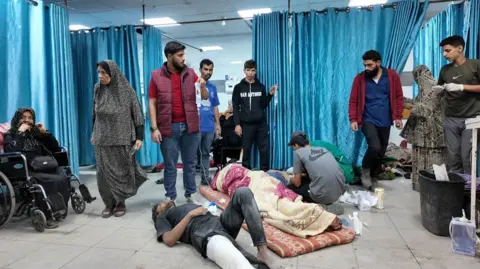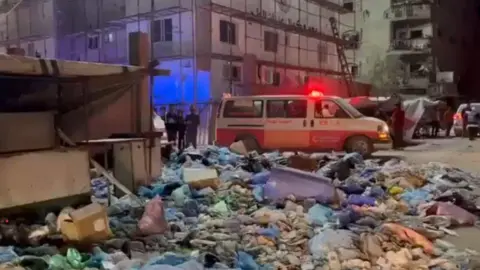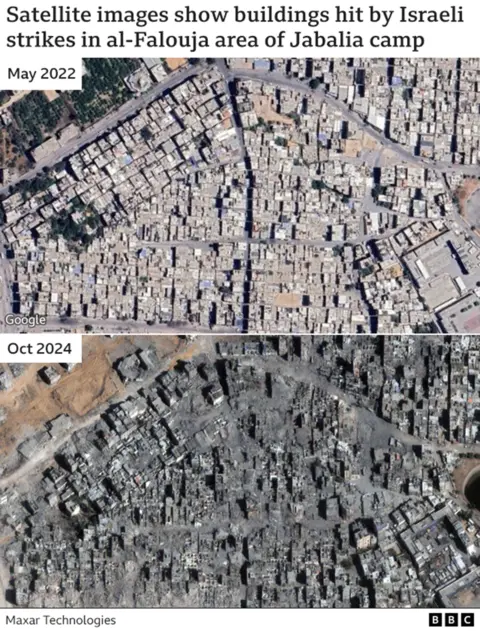 World Health Organization
World Health OrganizationThe UN human rights chief has said the war in Gaza’s “darkest moment” was unfolding in the north of the territory.
“As we speak, the Israeli military is subjecting an entire population to bombing, siege and risk of starvation,” Volker Türk said.
He called on the world’s leaders to act, saying states had a duty under the Geneva Conventions to ensure respect for international humanitarian law.
There was no immediate response from the Israeli military, but it has said its troops have killed “hundreds of terrorists” and evacuated 45,000 civilians in Jabalia since going back into the area for the third time on 6 October with the aim of stopping Hamas fighters regrouping there.
It comes as the head of the World Health Organization (WHO) said he was deeply disturbed by reports that Israeli troops have raided one of the last functioning hospitals in northern Gaza.
Dr Tedros Adhanom Ghebreyesus said the WHO had lost contact with Kamal Adwan hospital in Beit Lahia, which was overflowing with almost 200 patients amid an Israeli offensive in nearby Jabalia.
Gaza’s Hamas-run health ministry said Israeli troops had detained patients, staff and displaced people, while Israel’s military said its forces were operating “in the area” based on intelligence “regarding the presence of terrorists”.
Hundreds of Palestinians have reportedly been killed and tens of thousands displaced since Israeli forces went back into Jabalia.
Residents unwilling or unable to comply with Israeli evacuation orders are said to be living in increasingly desperate conditions, with food and other essential supplies running out.
The UN human rights chief warned on Friday that the entire population of northern Gaza was being subjected to “non-stop” bombing, with hundreds of thousands ordered to move with no guarantees of return.
“Unimaginably, the situation is getting worse by the day,” Türk said.
“The Israeli government’s policies and practices in northern Gaza risk emptying the area of all Palestinians. We are facing what could amount to atrocity crimes, including potentially extending to crimes against humanity.”
He also said it was totally unacceptable that Palestinian armed groups were reportedly operating among civilians, including inside shelters for the displaced, and putting them in harm’s way.
Türk said countries around the world – all of them parties to the Geneva conventions – had to act now to uphold them.
“These are universally accepted and binding norms developed to preserve the very bare minimum of humanity. I implore you to put the protection of civilians and human rights first and not to abandon that minimum of humanity,” he said.
Significantly, Türk added that where there was a risk of genocide, all states were legally bound to prevent it. Until now, senior UN figures have mostly avoided the word genocide in relation to Gaza.
Israel has long accused the UN of bias and rejected accusations that it has committed war crimes.
 World Health Organization
World Health OrganizationOn Friday morning, Gaza’s health ministry said in a statement Israeli forces had “stormed” Kamal Adwan hospital and were detaining hundreds of patients, medical staff and displaced people inside.
In the afternoon, the ministry said displaced men had been forced to take off their clothes and that some had been arrested.
A number of medical staff, including the director of the hospital Dr Hussam Abu Safiya, had also not been heard from since they were summoned to see Israeli forces stationed in the courtyard, it added.
A video posted on social media late on Thursday showed Dr Abu Safiya speaking on the telephone while walking through a busy ward with what appeared to be a shatter window and a damaged ceiling.
“Instead of receiving aid we receive tanks. Tanks that are shelling the building,” he says.
Eid Sabbah, the director of nursing, said in a voice note to Reuters news agency early Friday: “At midnight, the occupation army tanks and bulldozers reached the hospital. The terrorising of civilians, the injured and children began as [the Israeli forces] started opening fire on the hospital.”
He said the Israeli forces retreated when a delegation from the WHO arrived with an ambulance and evacuated some patients. However, tanks later returned to the surrounding area and opened fire at the hospital, hitting its oxygen stores, before troops began a raid and ordered staff and patients to leave, he added.
Dr Tedros later confirmed that a WHO team had reached the hospital on Thursday night “amid hostilities in the vicinity”, and transferred 23 patients and 26 caregivers to al-Shifa hospital in Gaza City. They also delivered units of blood, trauma and surgical supplies.
But he added that the UN agency had lost touch with staff at the hospital since the reports of the raid emerged.
“Kamal Adwan Hospital has been overflowing with close to 200 patients – a constant stream of horrific trauma cases. It is also full of hundreds of people seeking shelter,” he warned.
“We call for an immediate ceasefire; and protection of hospitals, patients, health professionals and humanitarians.”
The Israeli military said in a statement that its forces were “operating in the area of the Kamal Adwan Hospital in Jabalia, based on intelligence information regarding the presence of terrorists and terrorist infrastructure in the area”.
“In the weeks preceding the operation, the [forces] facilitated the evacuation of patients from the area while maintaining emergency services,” it added.

Jordan’s Foreign Minister Ayman Safadi urged US Secretary of State Antony Blinken to put pressure on Israel over the deteriorating humanitarian situation and the mass displacement of civilians in the north.
“We look at northern Gaza and we do see ethnic cleansing taking place, and that has got to stop,” he said at the start of a meeting in London.
Many Palestinians believe the Israeli military is implementing out the so-called “Generals’ Plan” in the north, which would see the forced displacement of all of the estimated 400,000 civilians there to the south followed by a siege of any remaining Hamas fighters.
The Israeli military has denied having such a plan and that it is making sure that civilians get out of harm’s way.
Safadi also warned that the Middle East stood on the “brink of regional war”, adding that every time he met Blinken the situation was getting worse, “not for lack of us trying but because we do have an Israeli government that is not listening to anybody, and that has got to stop”.
“The only path to save the region from that is for Israel to stop the aggressions on Gaza, on Lebanon, stop unilateral measures, illegal measures in the West Bank, that is also pushing the situation to the abyss,” he stated.
Blinken met with Arab leaders and foreign ministers in the UK following a diplomatic tour of the Middle East.
The US is believed to be working on a plan for post-conflict Gaza, trying to get buy-in from Arab countries even though progress on a ceasefire and hostage deal for Gaza has been stalled for weeks.
Blinken said he was having important conversations “on ending the war in Gaza and charting a path for what comes next”. He also said there was a “sense of real urgency in getting a diplomatic resolution” to the conflict between Israel and Hezbollah in Lebanon.
On Thursday, Israel said it would send the head of its Mossad intelligence agency to Doha on Sunday to meet the CIA director and Qatar’s prime minister amid renewed efforts to restart the Gaza ceasefire and hostage release talks.
It came after a Hamas delegation met Egyptian security officials in Cairo. Hamas said there had been no change in its conditions for a deal, which include the full withdrawal of Israeli troops from Gaza.
Israel launched a campaign to destroy Hamas in response to the group’s unprecedented attack on southern Israel on 7 October 2023, in which about 1,200 people were killed and 251 others were taken hostage.
More than 42,840 people have been killed in Gaza since then, according to the territory’s Hamas-run health ministry.







